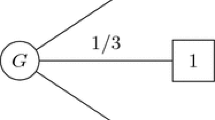Summary.
Differentiability is a convenient property of von Neumann-Morgenstern utility functions which is almost always imposed but has not been translated into behavioral terms. In applications, expected utility is usually maximized subject to a constraint, and the maximization is carried out by differentiating the utility function. This paper presents two sets of necessary and sufficient conditions for a risk averse von Neumann-Morgenstern utility function to be differentiable. The first of them is formulated in terms of the equivalent risk premia of small gambles. It says, in brief, that the equivalent risk premium is of a smaller order of magnitude than the risk itself, as measured by the expectation of the absolute value of the risk. The second set of necessary and sufficient conditions is formulated in terms of the probability premium of small lotteries. It says, essentially, that the probability premium for small binary lotteries goes to zero as the size of the lottery goes to zero.
Similar content being viewed by others
Author information
Authors and Affiliations
Additional information
Received: May 11, 1997; revised version: May 14, 1998
Rights and permissions
About this article
Cite this article
Nielsen, L. Differentiable von Neumann-Morgenstern utility. Economic Theory 14, 285–296 (1999). https://doi.org/10.1007/s001990050294
Issue Date:
DOI: https://doi.org/10.1007/s001990050294



